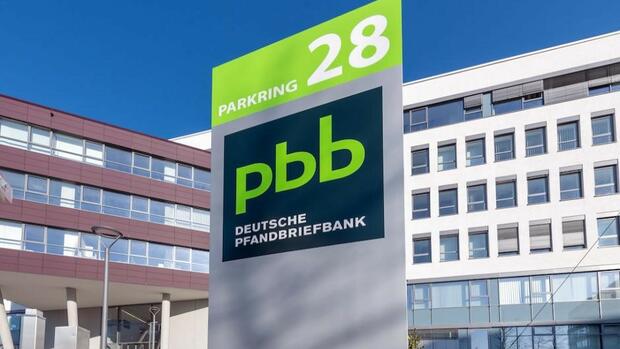Harsh criticism from Petrus Advisers – again and again.
(Photo: PBB)
Frankfurt The activist investor Petrus Advisers, who has made a name for himself in Germany with commitments at Comdirect, Aareal Bank and Teamviewer, accuses the Pfandbriefbank (pbb) of several failures. The criticism is directed against excessive risks in the lending business of the Munich real estate financier in Great Britain and the USA as well as a loss-making joint venture for municipal financing.
When asked, pbb emphasized that the recent turbulence in the global credit industry had shown that the bank was still on the right track with its “risk-conservative strategy”.
The London investor, who claims to have increased its stake in pbb from just under three percent to 3.2 percent since February, sees things differently. “Pbb is apparently another German bank that is destroying a lot of capital by late entry into markets that it does not understand,” says a letter from the hedge fund that is available to the Handelsblatt in advance.
The UK’s bad loan rate is “now at a shocking 13.3 per cent and their loan book is shrinking,” according to Petrus Advisers. A loan is considered non-performing or bad when there is evidence that the borrower is unlikely to be able to repay it or the borrower has been more than 90 days late in making payments. Petrus also criticized the high costs for the London location.
The London-based investor is also critical of entering into commercial real estate financing in the USA. “In the USA you are in the process of growing in the currently difficult New York office market – this is clearly in contrast to your ‘conservative’ management style,” complains Petrus Advisers. The proportion of non-performing loans in the US is 6.1 percent.
Bad loans in the UK and US
In financial circles it was said that the bad loans reported in Great Britain were legacy assets. It’s about four loans from the shopping center area. In view of the high proportion of bad loans in the US business, it was said that this rate does not necessarily reflect in the US that the loans are covered by collateral.
This does not appease the investor. “We call on the Board of Directors to carefully analyze these destructive errors and to consider clawing back bonuses (clawbacks) from the affected managers,” said Petrus Advisers. In financial circles it was said that such reclaims were linked to high hurdles at pbb that had not been met.
Another point of criticism relates to the Capveriant joint venture. pbb’s joint venture with the French bank Caisse des Dépôts (CDC) is a financing platform for the public sector.
Capveriant has “continuously burned money and destroyed value” over the past five years. According to calculations by Petrus Advisers, the losses in this period amount to 20 million euros. pbb expects to break even “at the earliest in 2025”.
>> Read here: The EU wants to make bank processing easier
From the investor’s point of view, pbb should ensure that Capveriant either quickly becomes profitable, is sold or is closed. A spokeswoman emphasized on request: “As part of our strategy program, we have been examining all our business areas and investments for some time for future viability and profitability.”
Petrus Advisers calls for share buybacks
Petrus Advisers spoke for the first time in February about Pfandbriefbank and accused the bank of “significant strategic weaknesses” and high costs, and called for share buybacks. In the current letter, Petrus Advisers reiterated the latter demand. These are to be financed by stopping new business in Great Britain and the USA.
The Pfandbrief bank would need the approval of the bank supervisors to buy back shares. Unlike Commerzbank, for example, which can raise the money necessary for this measure from current profits, pbb would have to finance buybacks from equity.
Whether the banking regulator would approve that is an open question. In the past, the ECB’s banking supervisory authority had been critical of commercial real estate loans, which the Pfandbrief bank specializes in. Bank supervisors consider these loans to be relatively risky.
Petrus Advisers has repeatedly intervened successfully with German banks in recent years. In 2017, for example, the investor joined the Commerzbank subsidiary Comdirect, which was still listed on the stock exchange at the time, demanded cost reductions, later blocked the complete takeover of the online broker by Commerzbank and negotiated a higher settlement.
The real estate financier Aareal Bank also focused on high costs and low profitability. When financial investors finally wanted to take over Aareal Bank completely, Petrus Advisers put up resistance until the investor was accepted as a non-voting co-shareholder.
More: “Significant strategic weaknesses” – Petrus’ criticism of the Pfandbriefbank

